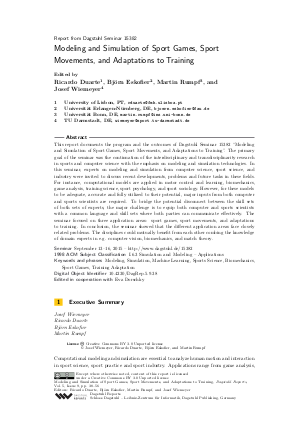Modeling and Simulation of Sport Games, Sport Movements, and Adaptations to Training (Dagstuhl Seminar 15382)
Authors Ricardo Duarte, Björn Eskofier, Martin Rumpf, Josef Wiemeyer and all authors of the abstracts in this report
-
Part of:
Issue:
Dagstuhl Reports, Volume 5, Issue 9
Part of: Volume: Dagstuhl Reports, Volume 5
Part of: Journal: Dagstuhl Reports (DagRep) - License:
 Creative Commons Attribution 3.0 Unported license
Creative Commons Attribution 3.0 Unported license
- Publication Date: 2016-01-19
File

PDF
DagRep.5.9.38.pdf
- Filesize: 0.99 MB
- 19 pages
Document Identifiers
Subject Classification
Keywords
- Modeling
- Simulation
- Machine Learning
- Sports Science
- Biomechanics
- Sport Games
- Training Adaptation
Metrics
- Access Statistics
-
Total Accesses (updated on a weekly basis)
0Document
0Metadata
Abstract
This report documents the program and the outcomes of Dagstuhl Seminar 15382 "Modeling and Simulation of Sport Games, Sport Movements, and Adaptations to Training". The primary goal of the seminar was the continuation of the interdisciplinary and transdisciplinarity research in sports and computer science with the emphasis on modeling and simulation technologies. In this seminar, experts on modeling and simulation from computer science, sport science, and industry were invited to discuss recent developments, problems and future tasks in these fields. For instance, computational models are applied in motor control and learning, biomechanics, game analysis, training science, sport psychology, and sport sociology. However, for these models to be adequate, accurate and fully utilized to their potential, major inputs from both computer and sports scientists are required. To bridge the potential disconnect between the skill sets of both sets of experts, the major challenge is to equip both computer and sports scientists with a common language and skill sets where both parties can communicate effectively. The seminar focused on three application areas: sport games, sport movements, and adaptations to training. In conclusion, the seminar showed that the different application areas face closely related problems. The disciplines could mutually benefit from each other combing the knowledge of domain experts in e.g. computer vision, biomechanics, and match theory.
Cite As Get BibTex
Ricardo Duarte, Björn Eskofier, Martin Rumpf, and Josef Wiemeyer. Modeling and Simulation of Sport Games, Sport Movements, and Adaptations to Training (Dagstuhl Seminar 15382). In Dagstuhl Reports, Volume 5, Issue 9, pp. 38-56, Schloss Dagstuhl – Leibniz-Zentrum für Informatik (2016)
https://doi.org/10.4230/DagRep.5.9.38
BibTex
@Article{duarte_et_al:DagRep.5.9.38,
author = {Duarte, Ricardo and Eskofier, Bj\"{o}rn and Rumpf, Martin and Wiemeyer, Josef},
title = {{Modeling and Simulation of Sport Games, Sport Movements, and Adaptations to Training (Dagstuhl Seminar 15382)}},
pages = {38--56},
journal = {Dagstuhl Reports},
ISSN = {2192-5283},
year = {2016},
volume = {5},
number = {9},
editor = {Duarte, Ricardo and Eskofier, Bj\"{o}rn and Rumpf, Martin and Wiemeyer, Josef},
publisher = {Schloss Dagstuhl -- Leibniz-Zentrum f{\"u}r Informatik},
address = {Dagstuhl, Germany},
URL = {https://drops.dagstuhl.de/entities/document/10.4230/DagRep.5.9.38},
URN = {urn:nbn:de:0030-drops-56844},
doi = {10.4230/DagRep.5.9.38},
annote = {Keywords: Modeling, Simulation, Machine Learning, Sports Science, Biomechanics, Sport Games, Training Adaptation}
}
